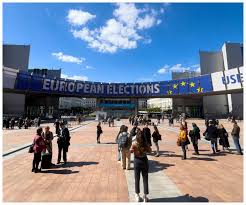European Parliament Elections:

The European Parliament elections this week will determine representatives who negotiate EU laws with member state governments, ensuring citizens’ representation in the EU.
- European Parliament is the directly elected legislative body of the European Union (EU).
- It is one of the EU’s main institutions and represents the citizens of the EU member states.
- The Parliament is headquartered in Strasbourg, France, but its work is conducted in three locations: Strasbourg, Brussels (Belgium), and Luxembourg.
- Primary Functions:
- Negotiating EU laws with member state governments.
- Approving the EU budget.
- Voting on international agreements and enlargements.
- Approving or rejecting the appointment of the European Commission president and commissioners.
- Composition, Term and Leadership:
- The EP comprises 720 members of the European Parliament (MEPs) who are elected by EU citizens every five years.
- MEPs then elect their president for a term of two and a half years.
- All candidates must be EU citizens.
- Voters may choose from individual candidates or delegates from political parties.
- Once elected, politicians from each nation join the European groups based on their political orientations.
- Elected MEPs cannot hold functions in national governments or other political bodies such as the EU Commission, the Court of Justice, or the Court of Auditors.




